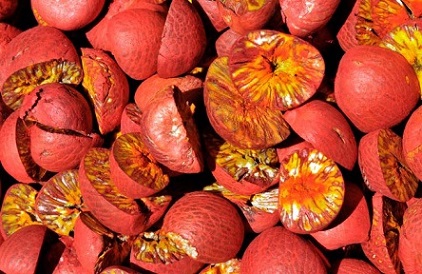Thailand medical researchers find that phytochemicals from the Areca Nut exhibit anti-neuroinflammatory properties
Nikhil Prasad Fact checked by:Thailand Medical News Team Aug 29, 2024 1 year, 3 months, 3 weeks, 3 days, 13 hours, 48 minutes ago
In an exciting breakthrough, medical researchers in Thailand have discovered that phytochemicals derived from the Areca Nut, commonly known as Betel Nut, exhibit significant anti-neuroinflammatory properties. This finding, spearheaded by teams from Chulalongkorn University and Mahidol University, could pave the way for new treatments targeting neuroinflammatory conditions, which are often linked to serious neurodegenerative diseases. This
Thailand Medical news report delves into the study's findings, shedding light on how these natural compounds could offer hope in the fight against brain inflammation.
 The Power of the Areca Nut
The Power of the Areca Nut
The Areca Nut, or Areca catechu, is a fruit well-known across South and Southeast Asia for its traditional medicinal uses. While it has been widely used for various health benefits, its potential impact on brain health has remained relatively unexplored - until now. The recent study conducted by researchers from the College of Public Health Sciences and the Center of Excellence on Natural Products for Neuroprotection and Anti-Aging (Neur-Age Natura) at Chulalongkorn University, in collaboration with Mahidol University's Institute of Nutrition, aimed to uncover the nut's effects on neuroinflammation, a key factor in neurodegenerative diseases.
The research team focused on the Areca Nut's ethanolic extract (ACEE) and its bioactive compounds, such as arecoline, (-)-epicatechin, and syringic acid. These compounds were tested against anthracene-induced neuroinflammation in BV-2 mouse microglial cells, which serve as a model for studying inflammatory responses in the brain.
Understanding Neuroinflammation
Neuroinflammation is an inflammatory response within the brain or spinal cord, primarily driven by microglia - the resident immune cells of the central nervous system. While inflammation is a natural defense mechanism, chronic neuroinflammation can lead to a range of neurological disorders, including Alzheimer's and Parkinson's diseases. The study explored how the phytochemicals in the Areca Nut could mitigate these inflammatory processes, potentially offering a new therapeutic avenue.
In the study, the researchers induced inflammation in BV-2 cells using anthracene, a type of polycyclic aromatic hydrocarbon (PAH) known for its neurotoxic effects. The cells were then treated with ACEE and its key compounds to observe their impact on inflammation markers.
Key Findings of the Study
The study's findings were nothing short of remarkable. ACEE and its bioactive compounds demonstrated significant anti-inflammatory effects, effectively reducing the levels of key inflammatory mediators such as tumor necrosis factor-alpha (TNF-α), interleukin-1 beta (IL-1β), and interleukin-6 (IL-6). These cytokines are typically elevated in response to neuroinflammation and are associated with the progression of neurodegenerative diseases.
One of the standout phytochemical compounds, (-)-epicatechin, showed the highest binding affinity for the NF-κB protein, a central player in the inflammatory response. By inhibiting NF-κB activation, (-)-epicatechin effectively suppressed the production of pro-inflammatory cytokines, th
ereby reducing inflammation in the brain.
The study also revealed that ACEE and (-)-epicatechin could mitigate oxidative stress in the cells, as evidenced by a reduction in reactive oxygen species (ROS) production. Oxidative stress is a significant contributor to neuroinflammation and neurodegeneration, and its reduction is crucial in preventing further neuronal damage.
Molecular Insights and Mechanisms
The researchers employed a combination of molecular docking studies and in vitro assays to unravel the mechanisms behind these effects. Molecular docking showed that (-)-epicatechin binds strongly to the NF-κB protein, preventing its activation. This was corroborated by the Western blot analysis, which confirmed that ACEE and (-)-epicatechin effectively inhibited the phosphorylation of JNK and p38, key signaling molecules in the MAPK pathway that drive inflammation.
Further analysis revealed that these compounds also induced the expression of heme oxygenase-1 (HO-1), a protective enzyme with antioxidant properties. The upregulation of HO-1 is associated with reduced oxidative stress and inflammation, further underscoring the potential therapeutic value of the Areca Nut.
Potential for Future Therapies
This study highlights the potential of Areca Nut phytochemicals as natural anti-inflammatory agents that could be harnessed to develop new therapies for neuroinflammatory conditions. Given the complexity of neurodegenerative diseases and the limited effectiveness of current treatments, the discovery of natural compounds that can modulate inflammation and oxidative stress offers a promising new direction.
The researchers emphasize that while these findings are preliminary, they lay the groundwork for further studies to explore the therapeutic potential of these compounds in clinical settings. Future research could involve testing these phytochemicals in animal models of neurodegenerative diseases to assess their efficacy and safety in more complex biological systems.
Conclusion
The discovery that phytochemicals from the Areca Nut exhibit strong anti-neuroinflammatory properties opens new avenues for the treatment of neurodegenerative diseases. The findings from this study underscore the importance of exploring traditional herbal medicines for modern therapeutic applications. The Areca Nut, long used in traditional medicine, may hold the key to developing natural, effective treatments for conditions that currently have few options.
The study findings were published in the peer-reviewed journal: Nutrients.
https://www.mdpi.com/2072-6643/16/17/2882
For the latest on
Thailand Medical Research or Medical Innovations, keep on logging to
Thailand Medical News.
Read Also:
https://www.thailandmedical.news/news/thailand-medical-study-finds-agarwood-extracts-offer-neuroprotective-benefits-and-can-prevent-neurodegenerative-diseases
https://www.thailandmedical.news/news/thailand-medical-study-identifies-p-pentosaceus-as-a-potential-antimicrobial-probiotic-with-cholesterol-reducing-properties 